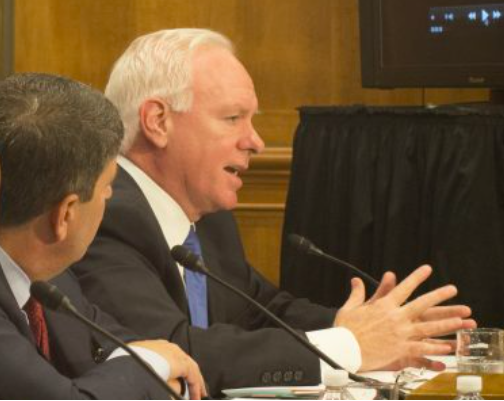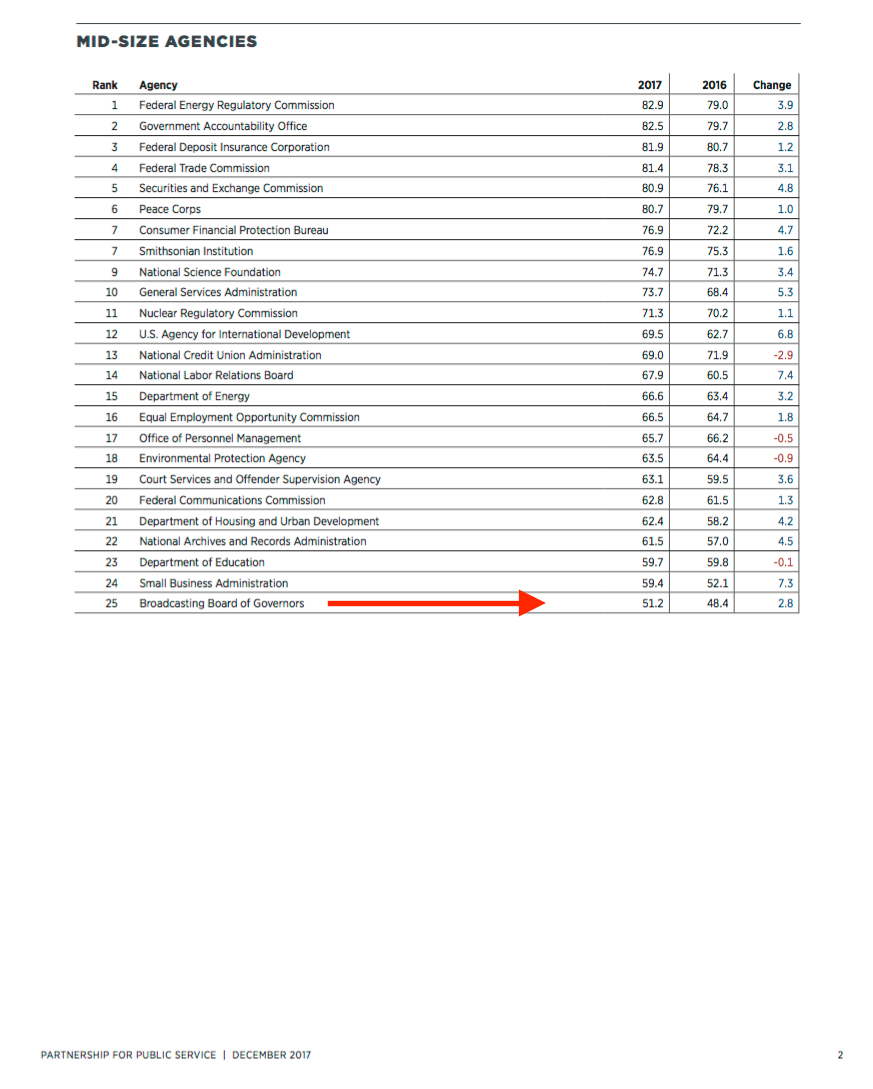BBG Watch Commentary
The Partnership for Public Service has released its 2017 Best Places to Work in the Federal Government® rankings showing that the Broadcasting Board of Governors (BBG), still under the Obama administration holdovers in two key jobs — BBG CEO John Lansing and Voice of America (VOA) director Amanda Bennett — has maintained its worst place to work ranking among mid-size agencies and has fallen further down against other agencies in the same category.
During the first months of the Trump administration, the U.S. Office of Personnel Management’s Federal Employee Viewpoint Survey (FEVS), on which the Partnership for Public Service rankings are based, showed a government-wide increase in employee morale throughout the federal government, but the BBG, while benefitting slightly from the government-wide gain, nevertheless was below the average, and thus secured its last place on the list. The government-wide gain was clearly based on some external factors, which not even the Washington Post columnist Joe Davidson who is an expert on the federal government workforce, could explain
The overall gain among mid-size agencies in the 2017 Partnership for Public Service’s 2017 Best Places to Work in the Federal Government® rankings was 3.6., with some agencies showing 7.3, 7.4, and 5.3 gains. The BBG’s gain was only 2.8.
The gap between the BBG in the last place and the next mid-size government agency, the Small Business Administration (SBA), has actually increased between 2016 and 2017. The BBG is now firmly at the bottom of the list, well below the SBA.
Most other agencies on the list have shown greater improvements in 2017 than the Broadcasting Board of Governors.
The overall rankings are determined by the agencies’ Best Places to Work index scores, which measure employee engagement. The index score is not an combined average of an agency’s category scores. Instead it is derived from three different questions in the U.S. Office of Personnel Management’s FEVS survey.
The rankings by the Partnership for Public Service, a nonprofit, nonpartisan NGO, measure the organizational health of federal government agencies.
BBG Claims of “Good News” Were Deceptive
Rank and file federal employees of the Broadcasting Board of Governors did not buy the “good news” message on employee morale from BBG CEO John Lansing sent out several weeks ago in response to preliminary FEVS survey results. An email circulating among BBG’s rank and file employees described the Office of Personnel Management 2017 FEVS results for the Broadcasting Board of Governors as “disastrous.”
SEE: BBG workers don’t buy ‘good news’ on morale from CEO Lansing, BBG Watch, October 16, 2017.
Another indirect rebuke to John Lansing’s “good news” message came from the American Federation of Government Employees (AFGA Local 1812), the largest union representing BBG employees.
SEE: Union explains why BBG remains worst-managed federal agency, BBG Watch, November 14, 2017.
Critics say that major part of the problem are BBG and VOA top executives. Former BBG chairman and current member, Hollywood film executive Jeff Shell, his BBG CEO choice John Lansing, a former entertainment TV executive inexperienced in government operations and public diplomacy, and VOA director Amanda Bennett, also lacking prior experience in these areas, have been heaping praise on the agency’s top managers, past and present, who together with them are responsible for the dismal employee morale.
Longtime and more recently hired executives of the agency, which Chairman of the House Foreign Affairs Committee Rep. Ed Royce had described as “crippled by an inefficient bureaucracy and incoherent leadership structure“ were called by Jeff Shell a year ago as “amazing.” “The place wouldn’t be what it is today without that group,” Jeff Shell said.
Indeed, it is worse than it has ever been.
Jeff Shell and John Lansing were joined in their congratulations to the Broadcasting Board of Governors and Voice of America senior management team by VOA director Amanda Bennett.
The only amazing thing about the senior BBG/VOA leadership has been its ability to keep the agency in the last place in employee morale year after year.
The Partnership for Public Service says that “since the first rankings were released in 2003, they have provided a mechanism to hold agency leaders accountable for the health of their organizations; serve as an early warning sign for agencies in trouble; and offer a roadmap for improvement.”

